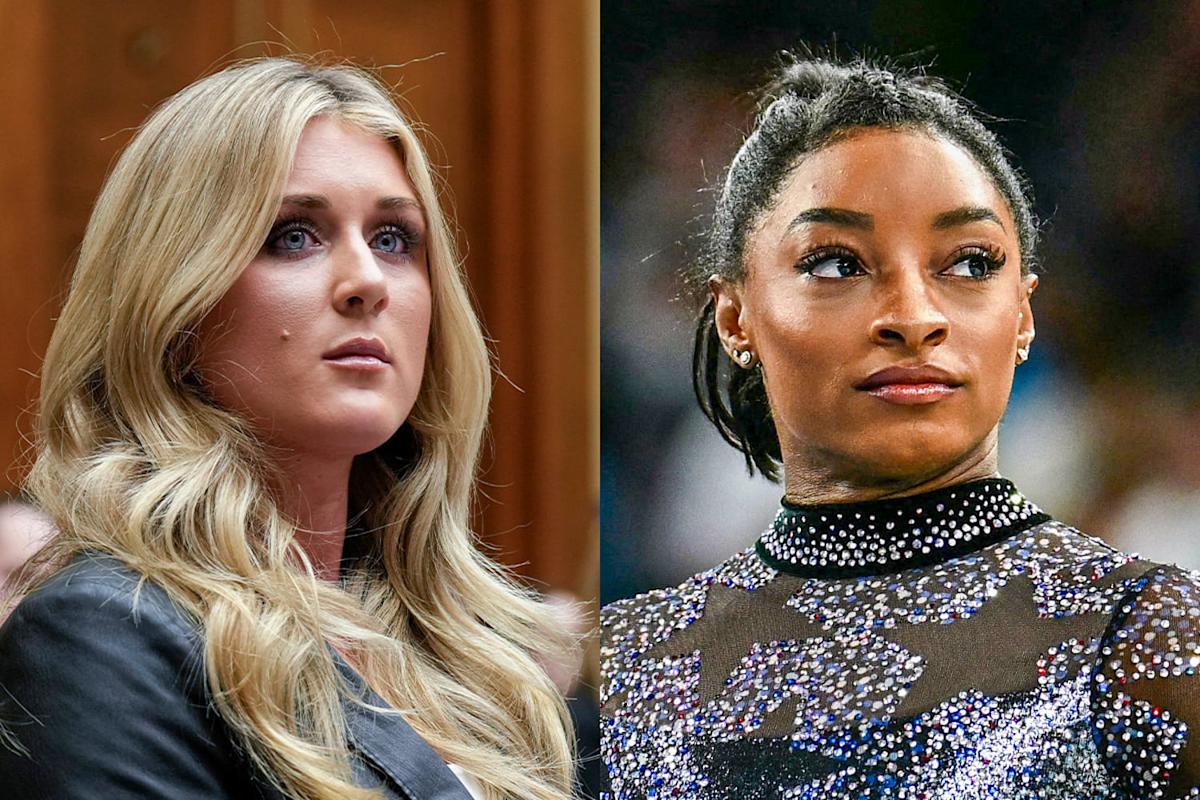Olympic gymnastics champion Simone Biles has recently voiced her strong disapproval of Riley Gaines, a former college swimmer who has become an outspoken critic of transgender athletes participating in women’s sports. In a passionate post on X (formerly Twitter), Biles referred to Gaines as “sick” and a “sore loser.” This clash highlights the ongoing debate surrounding transgender athletes and their right to compete in alignment with their gender identity.
Biles, who has rightfully earned her title as the most decorated Olympic gymnast in history, challenged Gaines by stating, “You should be uplifting the trans community and perhaps finding a way to make sports inclusive OR creating a new avenue where trans feel safe in sports.” Her suggestion of a potential transgender category in all sports aims to foster inclusivity rather than exclusion. “But instead… You bully them,” she continued, emphasizing that the current climate in sports can feel unsafe with individuals like Gaines challenging the inclusion of transgender competitors.
Riley Gaines gained notoriety after tying for fifth place in a race against Lia Thomas, a transgender swimmer representing the University of Pennsylvania. This competition was a focal point in the conversation about transgender women in sports, leading Gaines to carve out a career largely based on advocating against their participation. She argues that including these athletes can undermine the fairness of competitions and can sometimes compromise the safety of other competitors.
With over 1.5 million followers on X, Gaines has used her platform to publicly criticize and mock transgender athletes. This newfound influence in conservative media has allowed her to garner significant attention for her controversial views. Most recently, she posted an image of a high school girls’ baseball team in Minnesota, claiming one of the players was transgender and calling the athlete a boy—an act that prompted Biles’ fierce response.
In response to Biles’ criticism, Gaines took to X once again, expressing her disappointment in the gymnast’s stance. “This is so disappointing. My take is the least controversial take on the planet,” she wrote. Gaines continued by calling Biles a “male-apologist at the expense of young girls’ dreams,” exposing the tension between advocates for inclusivity in sports and those who are concerned about fairness and safety in competition.
The debate surrounding transgender girls and women competing in female sports has intensified in recent years. Political leaders have engaged in the discourse, notably, former President Donald Trump, who signed an executive order aimed at prohibiting transgender women and girls from participating in female sports. Prior to this, at least 27 states had already enacted laws or regulations that prevent transgender students from engaging in sports consistent with their gender identities, according to data from the Movement Advancement Project—an LGBTQ think tank.
The backlash against transgender athletes has sparked protests, debates, and discussions throughout the country, effectively polarizing opinions. Advocates of inclusion argue that sports should be a haven for everyone, regardless of gender identity. They believe competitive spaces should promote understanding and acceptance, noting that bullying and exclusion run counter to the spirit of sportsmanship.
On the other hand, critics voice concerns about fairness and safety, advocating that allowing transgender women to compete against cisgender women could create an uneven playing field. This dichotomy raises essential questions about gender, fairness in sports, and the rights of individuals to participate in athletic competition.
While Biles encourages progress and emphasizes uplifting marginalized communities, her sentiment often frames a cultural conflict that extends beyond mere sports. The feminist movement, typically seen as an advocate for women’s rights, is now facing a division over how to include transgender women in that dialogue.
To move forward and truly support all athletes, discussions should focus on creating policies that respect and protect everyone, fostering an environment where sports can be inclusive. The notion of a new category for transgender athletes could spark a productive conversation about participation in sports—creating a path where everyone feels safe and valued.
Overall, the ongoing exchange between Biles and Gaines serves as a microcosm of the larger societal challenges we face regarding inclusion and identity. As discussions around transgender rights continue to evolve, the stakes are high—both for the lives of individuals seeking acceptance and for the integrity of competitive sports.
In conclusion, the fierce exchange between Simone Biles and Riley Gaines encapsulates a powerful moment in sports history. It prompts us to critically examine how we approach inclusion in athletics, ensuring that conversations remain respectful and aimed towards solutions. Whether through creating new pathways for participation or advocating for comprehensive policies, the ultimate goal should be to build a sporting environment where everyone can thrive.
Source link









